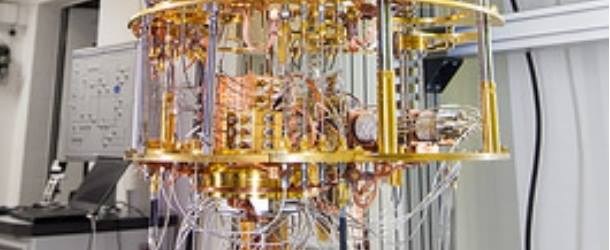Timothy Ferris Explains “The Most Interesting Machine in the World”

(AltaOnline) This an exhaustive discussion of the current and potential status of quantum computing by Timothy Ferris, an emeritus professor at UC Berkeley and the author of a dozen books, among them Seeing in the Dark and Coming of Age in the Milky Way. Ferris produced the Golden Record, an artifact of human music and other sounds of Earth launched aboard the twin Voyager interstellar spacecraft now exiting our solar system.
Enthusiasts are predicting that quantum machines will solve problems beyond the reach of conventional computers, transforming everything from medical research to the concepts of space and time. “I worry a lot about the hype,” John Preskill told me recently as we chatted in his office in the gleaming, glass-shrouded building at the California Institute of Technology in Pasadena where his Institute for Quantum Information does its weird work. A long-sighted physicist in the tradition of Caltech’s Richard Feynman, Preskill is a leading advocate of quantum computing. But even he pooh-poohs the idea that quantum computers will soon replace our laptops.
Such reservations haven’t kept governments and the private sector from betting that visionaries like Preskill—and like China’s Pan Jian-Wei, known in his homeland as the “father of quantum”—will succeed. The Chinese government is reportedly investing $11 billion in developing quantum computers and quantum-ready networks. The U.S. government and the Europe are in for more than a billion dollars each.
Long-term prospects aside, there’s a hardball motive for investing in quantum computing right now: if you don’t, somebody else may get there first. The challenge is starkly clear. Build a fully functional quantum computer first, and you might crack the other side’s codes before they can crack yours. Miss out, and you’re toast. The code-busting potential of quantum computing has not been lost on the Chinese government, which last November passed a law threatening to “punish” any private corporations employing ciphers the authorities can’t break.
The current state of the art is somewhere between IBM’s 50-qubit Q System One—a black-lacquer showpiece encased in a nine-foot borosilicate glass cube—and a 72-qubit machine being tested by Google. The Google machine said to have attained quantum supremacy employs a 53-qubit chip. (It was built to run 54 qubits but one never worked, so the researchers went with what they had.)
As Preskill puts it, a quantum computer using enough entangled qubits could “simulate efficiently any physical process that occurs in nature.” He expects such simulations to reveal the deeper quantum process that generates space and time. “Space-time comes from the emergent properties of this underlying system,” he asserts.



















